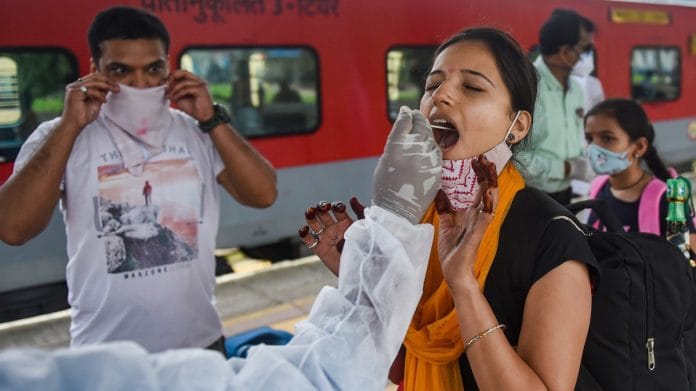Bengaluru: The Delta Plus variant, also known as AY.1 and designated as a variant of concern in India, has been detected in the genome sequence of a woman who died of Covid in Mumbai.
The woman, a 63-year-old who was reportedly fully vaccinated, died on 27 July. She is believed to be Mumbai’s first Delta Plus death.
The Delta Plus variant has been garnering attention due to its presence in increasing infections and deaths among Covid patients in India. The first reported death due to the variant was from the town of Ratnagiri in Maharashtra on 13 June in a completely unvaccinated patient.
Also read: Covid year brings 5% drop in routine immunisation, but states throw up surprising trend
What is Delta Plus?
The variant was first identified in Europe as having originated in Nepal, and is descended from the Delta variant or B.1.617. This variant was first identified in India last year, and is thought to be behind the devastating second wave that surged through the country this year.
The variant is characterised by the additional K417N mutation, which is thought to be immune-evasive and resistant to monoclonal antibodies.
India declared Delta Plus to be a variant of concern on 22 June after it was identified among multiple patients in Maharashtra. The health ministry had stated then that the variant displayed signs of increased transmissibility.
K417N mutation
The K417N mutation has been identified in other variants, including the Beta variant that was originally detected in South Africa. Some studies have indicated that it could reduce the ability of the virus to bind effectively to the ACE2 receptors in the body, with which the virus latches onto human cells.
The mutation has occurred at position 417 on the spike protein where the amino acid lysine is replaced by asparagine. It is also present in another variant of the Delta, the AY.2.
The Delta Plus variant has been detected in over 10 countries around the world, including the UK, the US, Canada, Russia and Japan.
According to the National Center for Disease Control, there is currently no evidence to indicate that the variant shows increased transmissibility.
Meanwhile, scientific experts and health authorities continue to urge increased testing and sequencing to track the variant more effectively.
(Edited by Paramita Ghosh)
Also read: Chandrayaan-2 confirms water on Moon surface, distinguishes H2O-rich areas from lunar deserts






